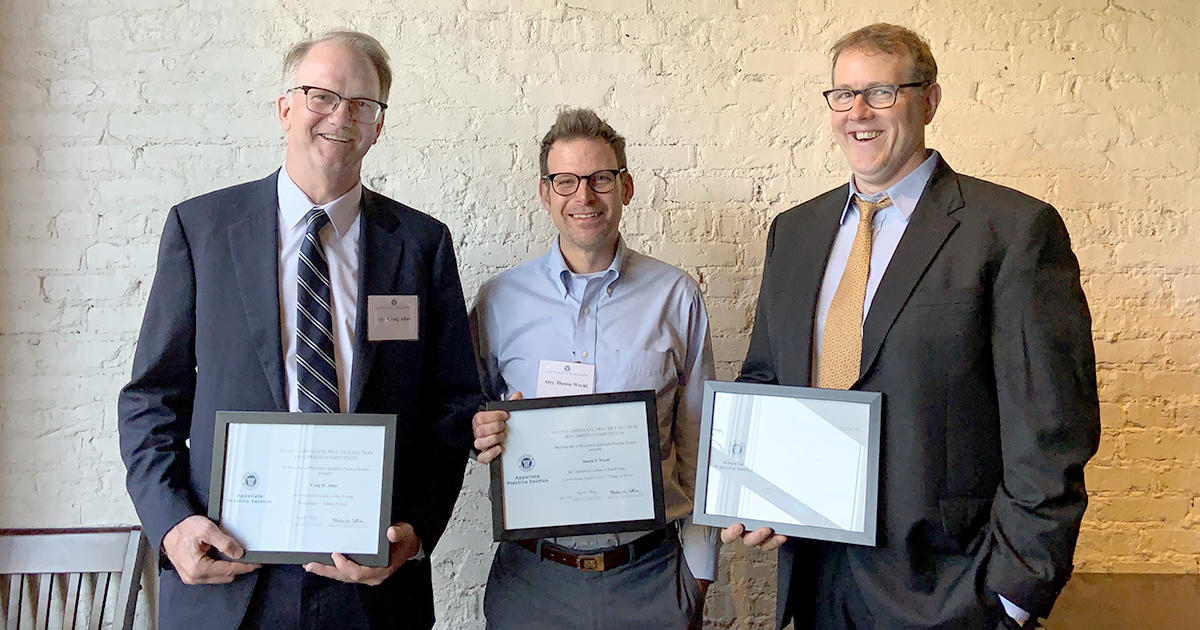
Winners of the 2022 Best Briefs competition were honored at a reception July 7, 2022, in Madison. From left: Craig W. Albee, Federal Defender Services of Wisconsin, Madison; Dustin T. Woehl of Kasdorf Lewis & Swietlik, Milwaukee; and Joeseph A. Bugni, Federal Defender Services of Wisconsin, Inc., Madison. Not pictured: Jason Gehring of Kasdorf Lewis & Swietlik, Milwaukee.
June 1, 2022 – The focus is the freedom of your clients, so be merciless and focused when editing your briefs, say the winners of the 2022 Best Briefs Competition from the State Bar of Wisconsin Appellate Practice Section.
The section holds the biennial competition to recognize great writers and promote appellate advocacy.
“The competition celebrates the art and craft of brief writing and showcases the writing of Wisconsin lawyers,” said Melissa Love Koenig, past chair of the Appellate Practice Section and legal writing professor at Marquette University Law School. “It provides good models of strong brief writing.”
The 2022 Winners
The 2022 Best Briefs Competition just concluded. Join us in congratulating these winners of the section’s fourth Best Briefs Competition:
Craig W. Albee and
Joseph A. Bugni of Federal Defender Services of Wisconsin Inc., Madison, for the
Appellants’ brief filed in the United States Court of Appeals for the Seventh Circuit in Jensen v. Pollard. Bugni was also a winner in the
first Best Briefs Competition and
the third Best Briefs Competition.
Dustin T. Woehl and
Jason P. Gehring of Kasdorf Lewis & Swietlik SC, Milwaukee, for the
Respondent’s brief filed in the Wisconsin Court of Appeals, District IV, in Lowe’s Home Centers, LLC v. Village of Plover.
Tips from the Winners
A finely tuned and powerfully written appellate brief teaches many lessons, and appellate attorneys are always striving to improve their written argumentation skills.
Here are tips from the winners:
 Albee: Our office puts a premium on collaboration and that’s especially true with our briefs. Everything we submit has a second or third set of eyes on it. Having other smart people (including the non-lawyers in the office) mercilessly edit and review the briefs for tone, clarity, and persuasiveness always improves the work product. In my view, the more red marks the better!
Albee: Our office puts a premium on collaboration and that’s especially true with our briefs. Everything we submit has a second or third set of eyes on it. Having other smart people (including the non-lawyers in the office) mercilessly edit and review the briefs for tone, clarity, and persuasiveness always improves the work product. In my view, the more red marks the better!
 Bugni: Great editing produces good writing. As essential as self-editing is, the best (and most helpful) edits come from a colleague who gets what is at stake: our client’s freedom. A truly effective editor doesn’t care about the brief writer’s ego. Instead, the focus rests on the brief and whether it’s persuasive and (in being persuasive) is truly a beautiful piece of advocacy. It takes a special personality and talent to edit like that – equal parts curmudgeon and maven. It has to be someone who not only hates insipid prose and weak logic, but who also has a strong sense of style and appreciates a clever turn of phrase. And it has to be someone who isn’t afraid to rewrite a section that doesn’t work and demand that the very same section be rewritten again until it sings. For the past decade, I have been blessed to have such an editor and friend. And I am honored to share this award with him.
Bugni: Great editing produces good writing. As essential as self-editing is, the best (and most helpful) edits come from a colleague who gets what is at stake: our client’s freedom. A truly effective editor doesn’t care about the brief writer’s ego. Instead, the focus rests on the brief and whether it’s persuasive and (in being persuasive) is truly a beautiful piece of advocacy. It takes a special personality and talent to edit like that – equal parts curmudgeon and maven. It has to be someone who not only hates insipid prose and weak logic, but who also has a strong sense of style and appreciates a clever turn of phrase. And it has to be someone who isn’t afraid to rewrite a section that doesn’t work and demand that the very same section be rewritten again until it sings. For the past decade, I have been blessed to have such an editor and friend. And I am honored to share this award with him.
 Woehl: I like the metaphor of brief writing as constructing a building, with a design and planning phase, a framing and rough carpentry phase, and a finishing phase. Each requires a different mindset. It’s easy to sabotage the process by fixating on a nuanced question of word choice while erecting the framework or by drafting arguments without first preparing blueprints to organize them or a frame to anchor them. I’ve found what works best for me is devoting ample time to planning and organizing and then roughing-out the arguments. With that in place, the details almost write themselves. That having been said, I’ll confess to sometimes slapping on a beautiful but unplanned addition at the last minute, writing a section in its entirety before knowing exactly what to do with it, or starting out by just writing and hoping that organization and structure will reveal themselves as I grapple with the issues. I think the key is being aware of the phases and what each one requires and then experimenting to find what works best for each writer and each brief.
Woehl: I like the metaphor of brief writing as constructing a building, with a design and planning phase, a framing and rough carpentry phase, and a finishing phase. Each requires a different mindset. It’s easy to sabotage the process by fixating on a nuanced question of word choice while erecting the framework or by drafting arguments without first preparing blueprints to organize them or a frame to anchor them. I’ve found what works best for me is devoting ample time to planning and organizing and then roughing-out the arguments. With that in place, the details almost write themselves. That having been said, I’ll confess to sometimes slapping on a beautiful but unplanned addition at the last minute, writing a section in its entirety before knowing exactly what to do with it, or starting out by just writing and hoping that organization and structure will reveal themselves as I grapple with the issues. I think the key is being aware of the phases and what each one requires and then experimenting to find what works best for each writer and each brief.
 Gehring: My goal when writing a brief is to be direct and clear. If the reader doesn’t understand my argument within the first couple of pages of argument, it suggests I don’t understand my argument and detracts from everything that follows.
Gehring: My goal when writing a brief is to be direct and clear. If the reader doesn’t understand my argument within the first couple of pages of argument, it suggests I don’t understand my argument and detracts from everything that follows.
Interested in more tips? See the results of the
first,
second, and
third competitions.
Judging the Competition
The Best Brief Competition is run by the Appellate Practice Section’s board. As in prior competitions, the board received about 50 brief nominations.
The briefs, with names redacted, were initially evaluated by a group of seven section board members, representing diverse areas of practice. They whittled the field down to 15 excellent finalists.
The finalist briefs were then evaluated by retired Wisconsin jurists for clarity of writing, depth of analysis, and persuasiveness, and not on the apparent merits of any issue. The number of winning briefs is at judges’ discretion.
We are truly grateful for the enthusiasm and time provided this year by Justice Janine Geske, Judge Paul Reilly, and Judge Jeff Davis, who selected this year’s winners.
The Next Competition Has Started: Enter Your Briefs by Dec. 31, 2023
Please watch for news about our fifth competition.
Briefs may be entered anytime on the State Bar’s website.
To qualify for the competition:
the primary author must be a State Bar member in good standing;
the brief must have been an opening or response brief submitted to the Supreme Court of Wisconsin, the Wisconsin Court of Appeals, the U.S. Court of Appeals for the Seventh Circuit, or the U.S. Supreme Court;
the appeal in which the brief was submitted must have been resolved between January 1, 2022, and Dec. 31, 2023; and
the brief entered does not need to be the winning brief on appeal.
More on Writing Topflight Appellate Briefs
Looking for additional resources on excellent brief writing? Check out these resources:
